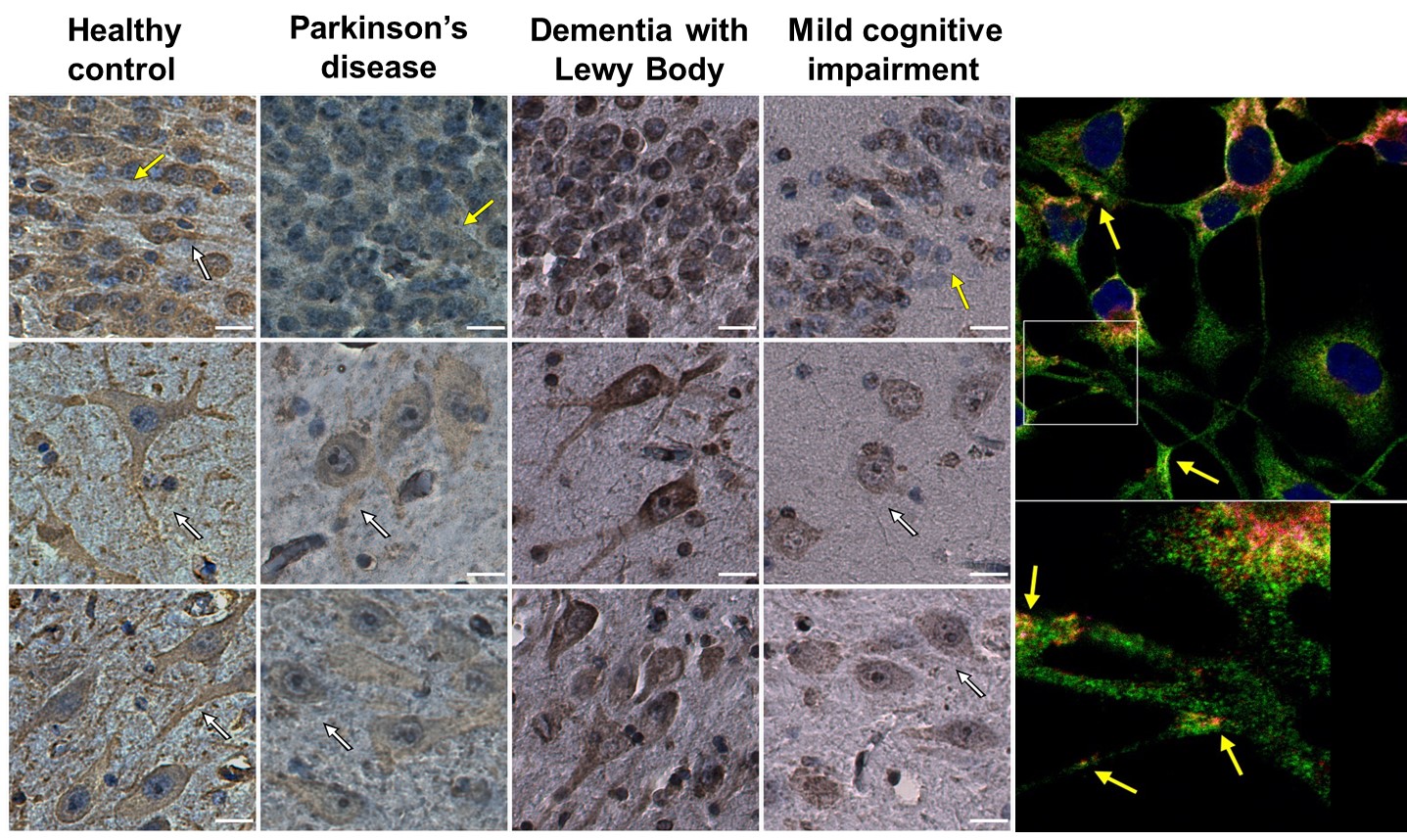Monday, 27 February 2023
New research suggests how toxic proteins in the brain that cause Lewy body dementia and Parkinson’s disease to develop, could be used to help develop new targeted treatments.
Experts from the University of Nottingham have discovered that modification of Ribonucleic acid (RNA) in human brain tissue is disrupted in neurodegenerative diseases including dementia with Lewy bodies and Parkinson’s disease.
Published in Neuropathology and Applied Neurobiology, this is the first ever report to identify modified m6A RNAs as a novel molecular mechanism that is altered in Lewy body disease, which may drive the formation of neurotoxic protein aggregates called Lewy Bodies. This RNA modified mechanism, which shows important differences between Lewy body disorders, could be targeted for developing better molecular therapeutics.

The research was led by Dr Helen Miranda Knight in the School of Life Sciences at the University of Nottingham, along with other researchers across the Schools of Life Science and Biosciences. It was conducted using the University of Nottingham’s state-of-the-art School of Life Sciences Imaging (SLIM) microscopy facility.
The function of nerve cells in the brain depends on proteins that are made using information encoded by bases within RNA. If a methyl group is added to an adenosine base (known as m6A modification), this can influence the fate of RNAs. It also suggests that proteins needed for normal neuronal function, may be displaced, or produced at the wrong time in the right subcellular structures within cells.
Researchers used microscopy and a machine learning approach to investigate the spatial location and abundance of modified RNA in human cells in brain regions important for memory and cognitive ability, such as the hippocampus, and frontal and cingulate cortices.
This showed that m6A modification is considerably increased in dementia with Lewy bodies but significantly decreased in Parkinson’s disease. In both diseases, researchers discovered that modified RNA are misplaced within cells, particularly in regions of the brain where synapses are located. Data also indicated that the proteins involved in the process of m6A modification are changed in individuals with Alzheimer’s disease or who show cognitive resilience.
This research provides new understanding of molecular processes going awry, and which are potentially driving, early-stage disease (in Lewy Body dementia and Parkinson's disease)
Commenting on the research, Dr Helen Miranda Knight, said: “Our findings support evidence that changes in m6A modification of RNA may be a mechanism influencing the formation of toxic protein aggregates such as Lewy bodies, amyloid plagues and neurofibrillary tangles, which cause neuronal dysfunction in Lewy body dementia, Parkinson’s disease and Alzheimer’s disease.
“With treatment studies of neurodegenerative diseases currently aiming to target the build-up of such abnormal toxic aggregates, this research provides new understanding of molecular processes going awry, and which are potentially driving, early-stage disease.
“The implications of these findings are important for the development of molecular interventions that target early stage disordered protein aggregation occurring within cellular nanodomains, and which could be protective against disease progression.”
The research paper, titled m6A mRNA methylation in human brain is disrupted in Lewy body disorders can be read in full here.
Story credits
For further information, please contact Dr Helen Miranda Knight in the School of Life Sciences at helen.knight@nottingham.ac.uk
Adam Mallaby - Media Relations Manager for the Faculty of Medicine and Health Sciences (Maternity Cover)
Email: adam.mallaby@nottingham.ac.uk
Phone: 0115 748 5719
Location:
Notes to editors:
About the University of Nottingham
Ranked 97 in the world and 17th in the UK by the QS World University Rankings, the University of Nottingham is a founding member of Russell Group of research-intensive universities. Studying at the University of Nottingham is a life-changing experience, and we pride ourselves on unlocking the potential of our students. We have a pioneering spirit, expressed in the vision of our founder Sir Jesse Boot, which has seen us lead the way in establishing campuses in China and Malaysia - part of a globally connected network of education, research and industrial engagement.
Nottingham was crowned Sports University of the Year by The Times and Sunday Times Good University Guide 2024 – the third time it has been given the honour since 2018 – and by the Daily Mail University Guide 2024.
The university is among the best universities in the UK for the strength of our research, positioned seventh for research power in the UK according to REF 2021. The birthplace of discoveries such as MRI and ibuprofen, our innovations transform lives and tackle global problems such as sustainable food supplies, ending modern slavery, developing greener transport, and reducing reliance on fossil fuels.
The university is a major employer and industry partner - locally and globally - and our graduates are the third most targeted by the UK's top employers, according to The Graduate Market in 2024 report by High Fliers Research.
We lead the Universities for Nottingham initiative, in partnership with Nottingham Trent University, a pioneering collaboration between the city’s two world-class institutions to improve levels of prosperity, opportunity, sustainability, health and wellbeing for residents in the city and region we are proud to call home.
More news…